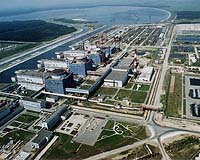 |
Singapore (AFP) June 9, 2010 Despite safety fears, Southeast Asia's energy-hungry economies are exploring the nuclear option to keep up with escalating power demand in a region of more than half a billion people. Vietnam plans to make its first nuclear plant operational in 10 years, while Singapore, Malaysia, Indonesia and Thailand are all exploring the feasibility of tapping atomic energy. "Everybody wants aircon, everybody wants the latest appliances, so all these translate into demand for electricity," says Anthony Jude, director for the energy and water division with the Manila-based Asian Development Bank (ADB). Detractors point to Southeast Asia's lack of experience in nuclear power and express doubts about the safety culture in a region prone to natural disasters such as earthquakes and volcanic eruptions. The Philippines built a nuclear plant in the 1970s but it was never operated commercially because of safety concerns and alleged corruption in the contract process. But the concerns are surmountable, experts said. "You cannot say nuclear power plants in Southeast Asia will necessarily be more dangerous than anywhere else," said Martine Letts, deputy director with the Sydney-based Lowy Institute for International Policy. She pointed to international institutions such as the World Association of Nuclear Operators to get Southeast Asia up to speed in nuclear power safety. Environmental group Greenpeace believes the region would be better off tapping renewable sources such as geothermal and solar power due to its vulnerability to natural disasters. "What's the reason to have nuclear power plants if we have so much renewable energy potential in this region?" Arif Fiyanto, Greenpeace's Jakarta-based regional climate and energy campaigner, told AFP. The appetite for power is certainly there, according to Jude, who told a recent seminar in Singapore that energy demand within the broader Asia-Pacific region was projected to grow an annual 2.4 percent until 2030. That is faster than the 1.1 percent annual growth in demand for the rest of the world. "How are we going to meet it?" the ADB official said. Jude said any country looking at nuclear power will have to prepare itself for the long haul. "Basically you have to look at planning, policies, regulations... you have to train a cadet of engineers in nuclear technology, nuclear safety, nuclear policy," he told AFP. "You got to have a cream of people in that field." Jude cited Vietnam as an exemplary case -- authorities began the groundwork for nuclear power plants more than a decade ago. Hanoi's communist lawmakers approved last November the construction of the country's first nuclear power stations with a total capacity of 4,000 megawatts. Estimated by experts to cost 11-18 billion dollars, the initial plans call for four reactors to be built with at least one expected to be operational from 2020. Malaysia laid out plans in May to build its first nuclear power plant by 2021 while in Singapore, the government has just started a feasibility study. Indonesia and Thailand have also considered nuclear power stations but face strong local opposition to the siting of reactors. A region that is overly reliant on fossil fuels needs to examine every alternative, according to Michael Quah, chief scientist with the Singapore-based Energy Studies Institute. "My belief is that most of us should develop a more balanced view," he said. "Just as if you would invest in stocks, you keep a portfolio mix. Similarly in energy, you have to keep a portfolio mix that is appropriate to the resources available in your region." Net electricity generation in non-industrial countries in Asia -- excluding China and India -- will more than double from 976 billion kilowatt hours in 2007 to 2.06 trillion kilowatt hours in 2030, according to estimates from the US Energy Information Administration. China now has 11 nuclear power reactors in operation and is building about two dozen more. India hopes soon to gain access to US know-how under a historic civil nuclear energy pact.
Share This Article With Planet Earth
Related Links Nuclear Power News - Nuclear Science, Nuclear Technology Powering The World in the 21st Century at Energy-Daily.com
 Russia, Iran to create joint venture for Bushehr: official
Russia, Iran to create joint venture for Bushehr: officialMoscow (AFP) June 8, 2010 Russia and Iran will establish a joint venture to operate Tehran's first nuclear plant set to come online this summer, Sergei Kiriyenko, chief of Russia's nuclear state corporation, said on Tuesday. Russia has been helping Iran build its first nuclear plant in the southern city of Bushehr since the mid-90s but its launch has been marred by a series of delays and the issue is hugely delicate ... read more |
|
| The content herein, unless otherwise known to be public domain, are Copyright 1995-2010 - SpaceDaily. AFP and UPI Wire Stories are copyright Agence France-Presse and United Press International. ESA Portal Reports are copyright European Space Agency. All NASA sourced material is public domain. Additional copyrights may apply in whole or part to other bona fide parties. Advertising does not imply endorsement,agreement or approval of any opinions, statements or information provided by SpaceDaily on any Web page published or hosted by SpaceDaily. Privacy Statement |